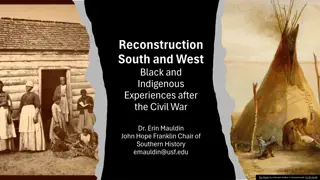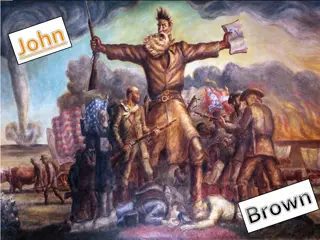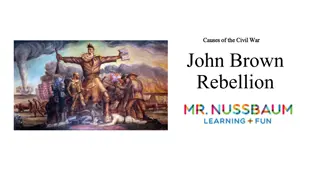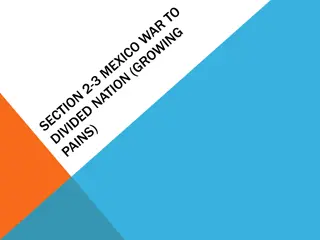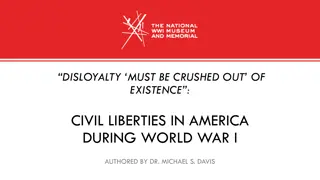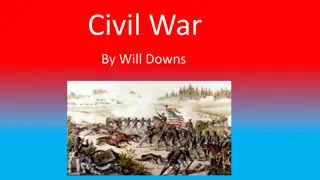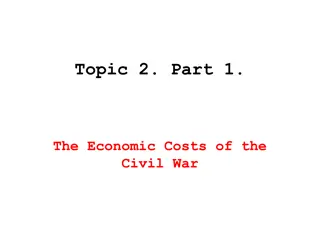Key Compromises and Events Leading to the Civil War
The Civil War was influenced by key compromises and events such as the Missouri Compromise, Compromise of 1850, Georgia Platform, and Kansas-Nebraska Act. Tensions arose due to the issue of slavery expansion and the balance between free and slave states. The population distribution between the North and South affected representation in the House of Representatives, leading to further discord. The Missouri Compromise, Maine's secession, and the growth of new states played pivotal roles in shaping the nation's trajectory towards the Civil War.
Download Presentation

Please find below an Image/Link to download the presentation.
The content on the website is provided AS IS for your information and personal use only. It may not be sold, licensed, or shared on other websites without obtaining consent from the author. Download presentation by click this link. If you encounter any issues during the download, it is possible that the publisher has removed the file from their server.
E N D
Presentation Transcript
Compromises and Acts a. Explain the importance of key issues and events that led to the Civil War; include Missouri Compromise, Compromise of 1850 and the Georgia Platform, Kansas-Nebraska Act 1
Total U.S. Population Population What impact would the population of the North and South at this time have on the House of Representatives? North 29% South 2
United States in 1819 Free States Illinois Indiana Ohio Pennsylvania New York New Jersey Connecticut Rhode Island Massachusetts 10. Vermont 11. New Hampshire Slave States Georgia South Carolina North Carolina Alabama Mississippi Louisiana Tennessee Virginia Kentucky 1. 2. 3. 4. 5. 6. 7. 8. 9. 1. 2. 3. 4. 5. 6. 7. 8. 9. 10. Maryland 11. Delaware 3
In 1820 the number of free states and slave states is equal. The Missouri Territory has met the requirements to become as state is applying to become a slave state. Northerners don't want to have more slave states than free, and southerners want slavery to expand into the western territories. If Missouri becomes a slave state, the number will be unequal and slavery might expand even farther. If Missouri becomes a free state, the number of those states will increase and slavery might be ended, hurting the South's plantation economy. What is the problem? What would YOU do? 4
Solution In 1820 Maine voted to secede from Massachusetts. The land that would become Maine was a part of Massachusetts but physically separate from the rest of it. The secession and formation of the state of Maine as the 23rd state occurred on March 15, 1820 as part of the Missouri Compromise. This kept a balance between slave and free states.[ 5
Missouri Compromise Missouri enters as a slave state Maine enters as a free state Slavery was prohibited north of the 36 30 parallel (the southern border of Missouri) in the land purchased during the Louisiana Territory. 7
The U.S. Continues to Grow Since the admittance of Missouri and Maine, other states had been admitted: Arkansas (Slave-1836) & Michigan (Free-1837) Florida (Slave-1845), Texas (Slave- 1845), Iowa (Free-1846) & Wisconsin (Free-1848) 8
In 1849, the number of free states and slave states is still equal. California wishes to enter the Union as free states. Congress wants to keep the number of slave states and free states the same, but there is also the idea of popular sovereignty. Popular sovereignty means the states have the right to decide for themselves whether to allow slavery. Southerners want a tougher Fugitive Slave Law if states enter the Union as free. This decision will determine the future of the United States. What is the problem and what would YOU do? 9
Compromise of 1850 California entered the Union as a free state Slave trading was ended in the District of Columbia, but the residents of DC could keep the slaves they already had. Texas gives up its idea of annexing New Mexico in exchange for paying off its debts. The land in this territory would then NOT be a part of a slave state. When ready, the territories of New Mexico and Utah would determine whether they wanted to be slave or free through popular sovereignty (Neither became states until after the Civil War). Congress passed the Fugitive Slave Act stating that slaves who ran away to free states would be returned to their owners and those that helped runaway slaves would be punished. 10
As with all laws, states must decide whether to vote for or against it. You are now a member of Georgia s legislative branch. How do you suggest Georgia respond to the Compromise of 1850? 12
What does the primary document say? 1. What does the Georgia Platform state is the most important thing? 2. What does the Georgia Platform state will cause them to split from the Union? 3. What does the Georgia Platform state will preserve the Union? 13
Georgia Platform With the promise of the passage of the Fugitive Slave Act, Georgia approved the Compromise of 1850. With Georgia leading the way, other southern states also accepted the Compromise preventing a civil war for 11 years. 14
In 1854, Senator Stephen Douglas from Illinois wanted a transcontinental railroad to go from his state to California. For the railroad to succeed, the land west of the Mississippi River would have to be organized into territories. In order to get the railroad approved by Congress, Douglas needed both northern and southern support. Using the Compromise of 1850 as a guide, Douglas called for popular sovereignty to decide the slavery issue in the Kansas and Nebraska Territories, however, the Missouri Compromise had banned slavery in this area. What would YOU do? 15
Kansas-Nebraska Act Repealed the Missouri Compromise and permitted for the possibility of slavery being allowed above the 36 30 parallel. Popular sovereignty would allow states to decide for themselves if they would be slave or free. The territory of Kansas, which was being considered for statehood, was flooded by both pro and anti- slavery supporters who came to the state to vote for or against the institution in Kansas. Soon after their arrival, the violence between the two sides escalated. For instance, John Brown and his sons killed five proslavery farmers in retaliation for violence committed by proslavery forces. With all of the bloodshed, Kansas became known as Bleeding Kansas. 17
Kansas-Nebraska Act In the end, Kansas was admitted as a free state in 1861 (though its first Constitution was proslavery). Nebraska, due to its location, was never in question as to how it would be admitted a free state. The Kansas-Nebraska act greatly divided the nation and destroyed the Missouri Compromise and Compromise of 1850. It also allowed for the rise of the Republican Party, when the Whig party split into a northern and southern faction. 18
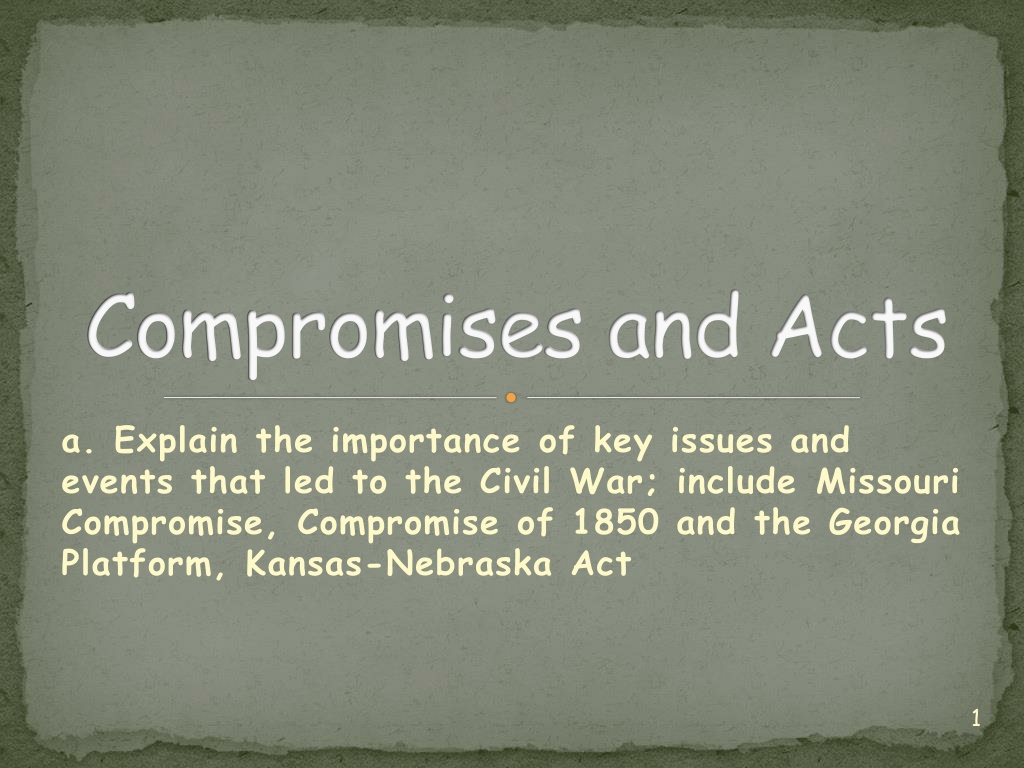

![❤[PDF]⚡ Civil War Talks: Further Reminiscences of George S. Bernard and His Fel](/thumb/20551/pdf-civil-war-talks-further-reminiscences-of-george-s-bernard-and-his-fel.jpg)
